Unit 3 Topic 3 What were you doing at this time yesterday? Section D课件
文档属性
| 名称 | Unit 3 Topic 3 What were you doing at this time yesterday? Section D课件 |  | |
| 格式 | pptx | ||
| 文件大小 | 17.9MB | ||
| 资源类型 | 试卷 | ||
| 版本资源 | 仁爱科普版 | ||
| 科目 | 英语 | ||
| 更新时间 | 2022-11-15 14:10:08 | ||
图片预览


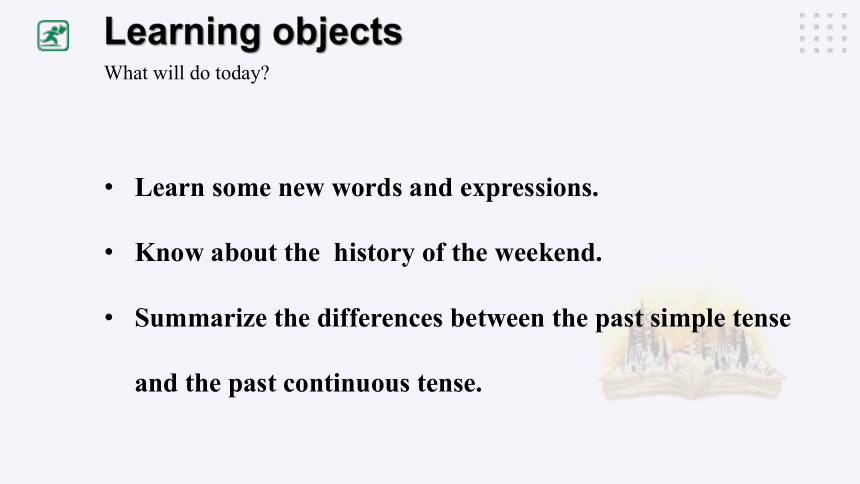
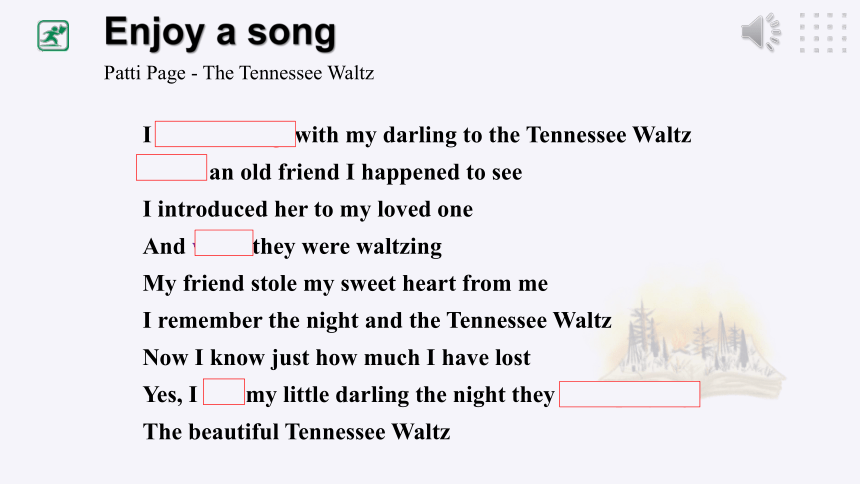
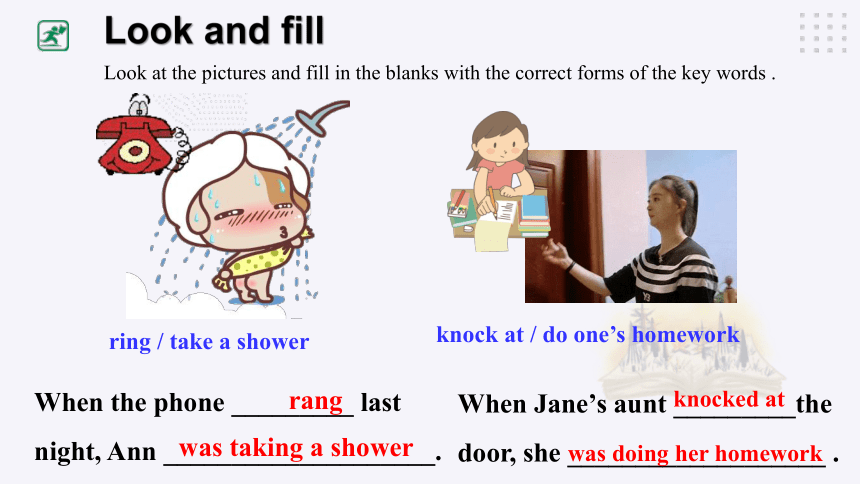
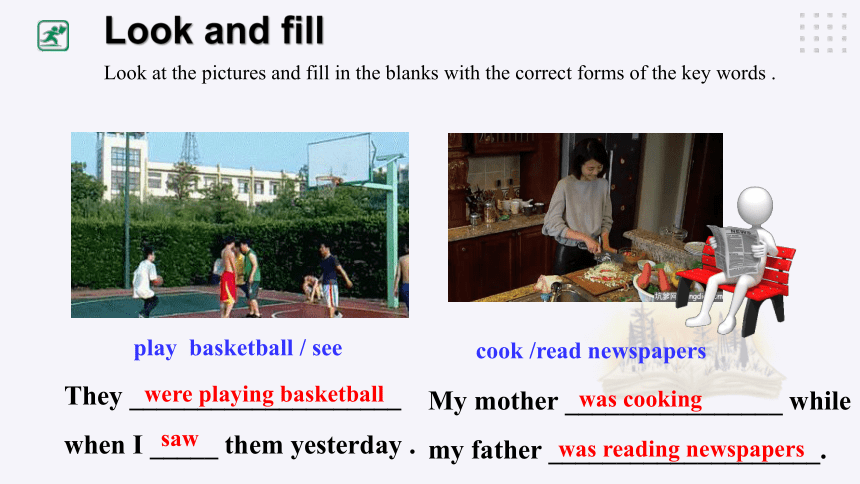
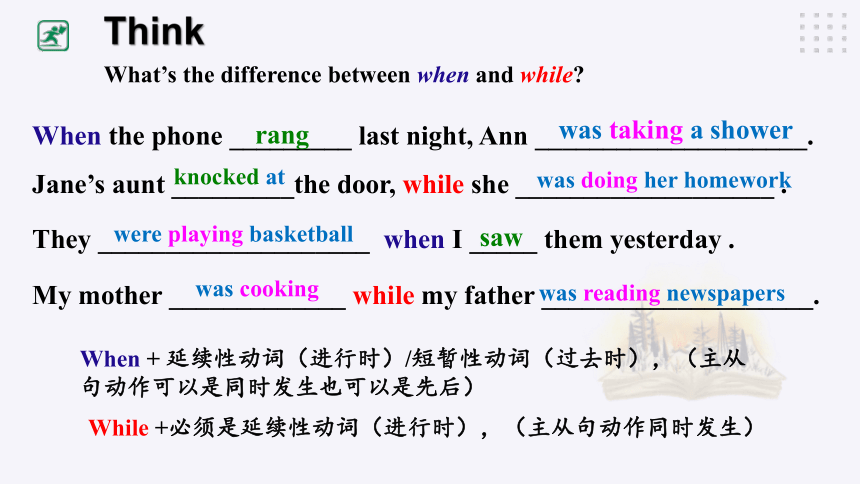
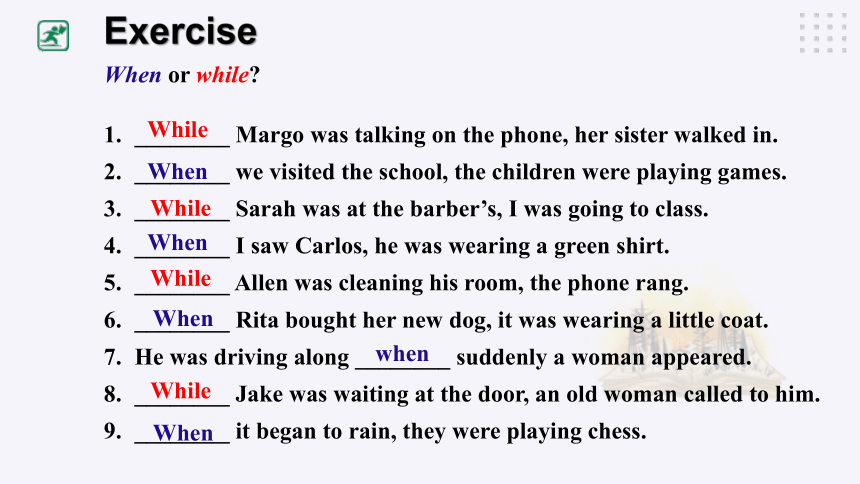
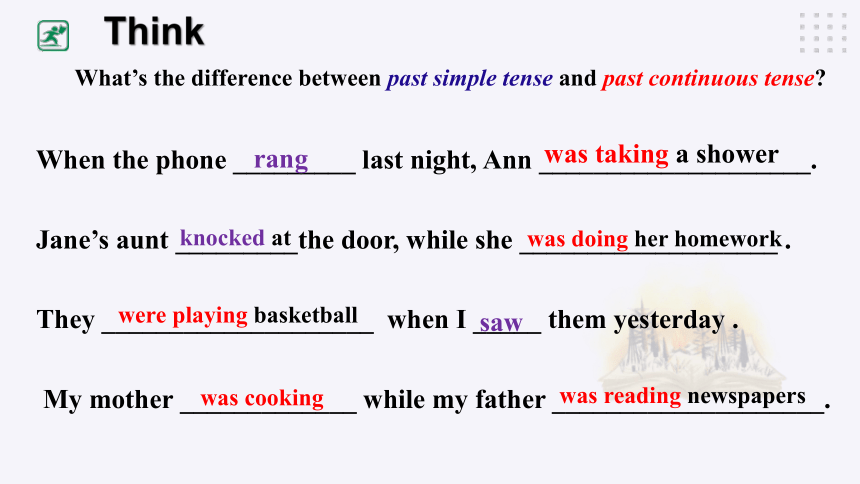
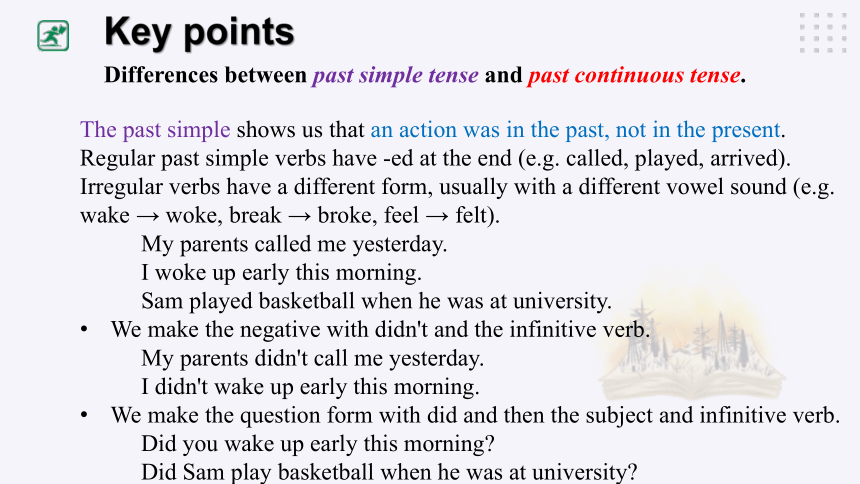
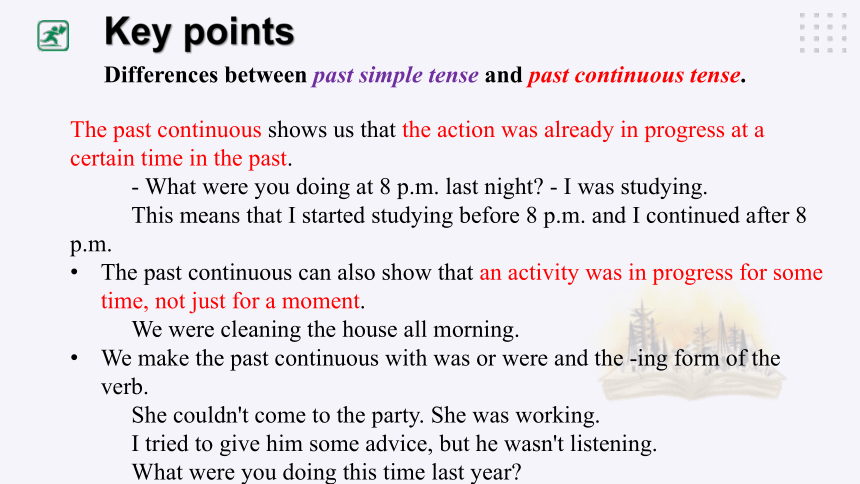
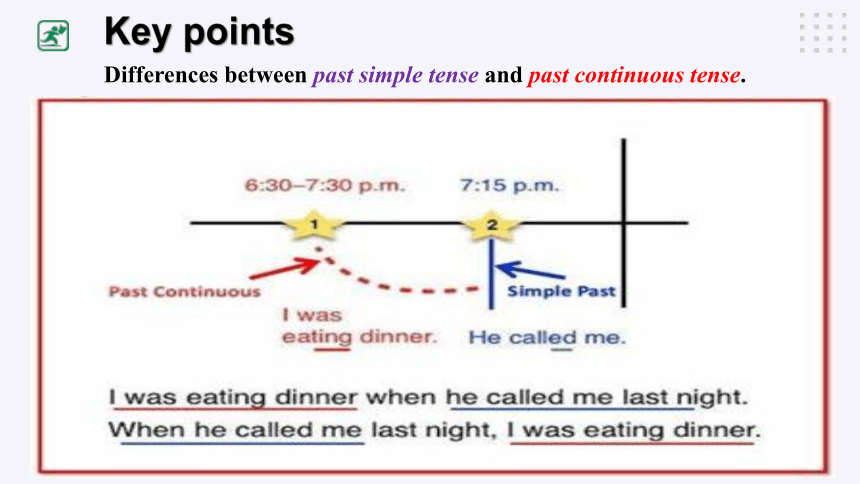
文档简介
(共31张PPT)
Snow White
Unit 3 Our hobbies
Section D
Topic 3 What were you doing at this time yesterday
Learning objects
What will do today
Learn some new words and expressions.
Know about the history of the weekend.
Summarize the differences between the past simple tense and the past continuous tense.
Enjoy a song
Patti Page - The Tennessee Waltz
I was dancing with my darling to the Tennessee Waltz
When an old friend I happened to see
I introduced her to my loved one
And while they were waltzing
My friend stole my sweet heart from me
I remember the night and the Tennessee Waltz
Now I know just how much I have lost
Yes, I lost my little darling the night they were playing
The beautiful Tennessee Waltz
Look and fill
Look at the pictures and fill in the blanks with the correct forms of the key words .
ring / take a shower
When the phone _________ last night, Ann ____________________.
rang
was taking a shower
knock at / do one’s homework
When Jane’s aunt _________the door, she ___________________ .
knocked at
was doing her homework
Look and fill
Look at the pictures and fill in the blanks with the correct forms of the key words .
play basketball / see
They ____________________ when I _____ them yesterday .
were playing basketball
saw
cook /read newspapers
My mother ________________ while my father ____________________.
was cooking
was reading newspapers
Think
What’s the difference between when and while
When the phone _________ last night, Ann ____________________.
rang
was taking a shower
Jane’s aunt _________the door, while she ___________________ .
knocked at
was doing her homework
They ____________________ when I _____ them yesterday .
were playing basketball
saw
My mother _____________ while my father ____________________.
was cooking
was reading newspapers
When + 延续性动词(进行时)/短暂性动词(过去时),(主从句动作可以是同时发生也可以是先后)
While +必须是延续性动词(进行时),(主从句动作同时发生)
Exercise
________ Margo was talking on the phone, her sister walked in.
________ we visited the school, the children were playing games.
________ Sarah was at the barber’s, I was going to class.
________ I saw Carlos, he was wearing a green shirt.
________ Allen was cleaning his room, the phone rang.
________ Rita bought her new dog, it was wearing a little coat.
He was driving along ________ suddenly a woman appeared.
________ Jake was waiting at the door, an old woman called to him.
________ it began to rain, they were playing chess.
When or while
While
When
While
When
While
When
when
While
When
Think
What’s the difference between past simple tense and past continuous tense
When the phone _________ last night, Ann ____________________.
rang
was taking a shower
Jane’s aunt _________the door, while she ___________________ .
knocked at
was doing her homework
They ____________________ when I _____ them yesterday .
were playing basketball
saw
My mother _____________ while my father ____________________.
was cooking
was reading newspapers
Key points
Differences between past simple tense and past continuous tense.
The past simple shows us that an action was in the past, not in the present. Regular past simple verbs have -ed at the end (e.g. called, played, arrived). Irregular verbs have a different form, usually with a different vowel sound (e.g. wake → woke, break → broke, feel → felt).
My parents called me yesterday.
I woke up early this morning.
Sam played basketball when he was at university.
We make the negative with didn't and the infinitive verb.
My parents didn't call me yesterday.
I didn't wake up early this morning.
We make the question form with did and then the subject and infinitive verb.
Did you wake up early this morning
Did Sam play basketball when he was at university
Key points
Differences between past simple tense and past continuous tense.
The past continuous shows us that the action was already in progress at a certain time in the past.
- What were you doing at 8 p.m. last night - I was studying.
This means that I started studying before 8 p.m. and I continued after 8 p.m.
The past continuous can also show that an activity was in progress for some time, not just for a moment.
We were cleaning the house all morning.
We make the past continuous with was or were and the -ing form of the verb.
She couldn't come to the party. She was working.
I tried to give him some advice, but he wasn't listening.
What were you doing this time last year
Key points
Differences between past simple tense and past continuous tense.
When we use these two tenses together, it shows us that the past simple action happened in the middle of the past continuous action, while it was in progress.
While I was studying, I suddenly felt sleepy.
We often use these tenses to show an action interrupting another action.
I broke my leg when I was skiing.
As I was going to work, I saw an old friend.
Can you see a difference in the meaning of these two sentences
When the guests arrived, Jane was cooking dinner.
When the guests arrived, Jane cooked dinner.
In the first one, Jane started cooking dinner before the guests arrived. We know that because it uses the past continuous. In the second sentence, the guests arrived first and then Jane started cooking.
Exercise
1. Tom ______ his friend at ten last night .
A. is calling B. were calling C. called D. was calling
2. My mother ______ when I got home .
A. is cooking B. cooks C. was cooking D. were cooking
3. It ______ all day yesterday .
A. rains B. raining C. is raining D. was raining
4. Ann was dancing while she ________ .
A. was singing B. is singing C. singing D. sang
5. - ____ you ______ kites at this time yesterday
- No, I wasn’t .
A. Was, flying B. Were , flying C. Are , flying D. Were, fly
Free talk
Did you have a good time last Sunday What were you doing at different times Write a passage about it. The following words and phrases may help you.
Activity Feeling
watch a movie wash one’s clothes play basketball visit friends … happy
excited
tired …
Example
Last Sunday I was very busy. I got up at 7:00 a.m. When Jim called me after breakfast, I was doing my homework. He wanted me to play with him. We played basketball happily from 10:00 to 12:OO.
In the afternoon, I was washing my clothes from 2:00 to 2:30. From 3:00 to 4:00 I was reading comics. At 4:30 I went with my parents to see my grandparents. After we got back home, I helped my mother do the cooking. After supper, we all went out for a walk, and then we were watching TV from 8:00 to 9:00.
When I went to bed, I felt very tired. But I was happy.
Forget about all the bad things that happened to you this week and just have a great weekend.
I love weekends
Read and complete
Complete the passage with the correct expressions.
felt too tired to work
were closed all day
rested and prayed
made Saturday afternoon a holiday
Before 1800, many people spent one day a week at church. In England, people called it a “holy day”. On that day, they__________.
In the early 1800s, Sunday was the “holy day”. However. many workers played games and had fun on that day. And they _______ on Monday mornings. In the USA, workers called them “blue Mondays”.
To solve the problem of “blue Mondays”, the English __________ in 1874. At one o’clock, everyone stopped working. This was the beginning of the idea of the weekend in England. By 1930, most American offices were closed on Saturday afternoons. By 1940, offices and factories in the USA _________ on Saturdays. And the two-day weekend began.
A Short History of the Weekend
C
A
D
B
Read and fill
Read and fill in the blanks.
Before 1800, people __________________and prayed on the holy day. In the early 1800s, people played games and _______on Sunday, so they felt ___________work on Monday mornings. In 1874, to _______________of “blue Mondays”, the English made Saturday afternoons a holiday. By 1930, I guess people could_______ on Saturday afternoon because the offices were closed. By 1940, people didn’t have to work on Saturday and Sunday, and the _________ weekend began.
rested and prayed
had fun
rest
two-day
A Short History of the Weekend
solve the problem
too tired to
Complete
Complete the mind map.
Sunday
activities
rested;
had fun
rested
…
Saturday
activities
all day:
morning: worked
afternoon: rested
(1p.m.:stopped
)
morning: worked
afternoon: rested
(offices were
)
all day:
rested
rested
…
rested
…
before 1800
in the early 1800s
in 1874
by 1940
by 1930
played games;
all day:
worked
prayed
worked
closed
working
A Short History of the Weekend
Free talk
What can you learn from the passage
What do you think of the history of the weekend
Talk show
Exercise
Finish Grammar.
Past Continuous
I _____ ______ a shower at this time yesterday.
Many people ______ _______ together in their warm homes.
________ you playing computer games
Yes, I was. / No, I wasn’t.
What _______ you ________ at this time yesterday
I ______ _______ some clothes.
was taking
were getting
Were
were
doing
was washing
Exercise
Functions
I agree. / I agree______ you. / I don’t agree.
I think ___. / I don’t think____.
I think it is just ______. I think he _____ ______ brave.
______ the line, please. You are quite _______.
with
so
so
so-so
is very
Hold
right
Summary
We learn:
some words and expressions: however, solve, factories, closed, pray …
the differences between when and while.
the differences between past simple tense and past continuous tense.
We can:
Sort information by time.
Homework
Read 1a aloud and fluently and finish the workbook. ( Levels A, B & C)
Tell the story to others. ( Levels A & B )
Search for information about where Saturday and Sunday get their names. ( Levels A & B )
Optional:
Read a passage: Origins of the days of the week
https://www.21cnjy.com/help/help_extract.php
Origins of the days of the week
Typically a day is 24 hours, or 1,440 minutes or 86,400 seconds. One day is divided into day time and night time, about 12 hours for each division. A week comprises seven days. Have you ever thought of where the term “day” came from What about the names of the days of the week
A constant day depends on the sun passing a local meridian at noon or at midnight, based on the geographical longitude and the time of the year, to some extent, measured at about 24 hours and +/- 30 seconds. Six hundred twenty million years ago, a day was estimated to have 21.9 hours. Today it has been calculated that a day on earth had increased in length due to the tides that are raised by the moon. The phenomenon slows down the rotation of the earth. Currently a day has 86,400.002 seconds, with an increase of 1.7 milliseconds every century. After the scientific data, let us take a look at the origin of the word “day” and the days of the week.
Origins of the days of the week
Sunday means the “sun’s day,” which came from the Latin term “dies solis.” The Latin translation of the day is Domenica, whose root word was retained by the other Romance languages, thus, it is called Dimanche in French, Domingo is Spanish and Domenica in Italian, In Dutch, Sunday is translated as Zondag while it is Sonntag in German.
Monday is derived from the Anglo-Saxon word, “monand g,” which translates to the moon’s day, a day that is sacred to the moon goddess. In Spanish, Monday is called Lunes from the Spanish word for moon, Luna. The Spanish root word is retained in the Italian Lunedi and French Lundi. In German, Monday is called Montag while Maandag is the Dutch translation for this day.
Origins of the days of the week
Tuesday belongs to Tyr, a Norse god. However, for the Romans Tuesday was the day of their god of war, Mars and called the day “dies Martis.” In Spanish, the day is called Martes, Martedi in Italian and Mardi in French. In Sweden, Tuesday is translated as Tisdag, Tirsdag in Danish, Dienstag in German and Dinsdag in Dutch.
Wednesday honors Odin or Wodan. For the Romans, it is the day for their god, Mercury and called Wednesday “dies Mercurii.” In French, Wednesday translates to Mercredi and it is Mercoledi in Italian. Miércoles is the Spanish translation for Wednesday and it is called Woensdag in Dutch and Mittwoch in German.
Thursday is Thor’s day, and is called Torsdag in the Norse languages. The Romans called this day for Jupiter or Jove’s Day (dies Jovis). Jeudi is the French translation for Thursday. In Spanish, it is Jueves, Giovedi in Italian, Donderdag in Dutch and Donnerstag in German.
Origins of the days of the week
Friday salutes Frigg, the Norse goddess. Frigedag is the translation of this day in Old High German. It is the day of Venus according to the Romans and called the day as “dies veneris.” In Italian it is called Venerdi, Viernes in Spanish, Freitag in German, Vrijdag in Dutch and Vendredi in French.
Saturday honors Saturn and is called “dies Saturni by the ancient Romans. In Norse and Danish languages it is called L rdag, and L rdag in Swedish. In Dutch it is Zaterdag, Sabato in Italian, Samedi in French, Samstag in German, and Sábádo in Spanish.
Snow White
Unit 3 Our hobbies
Section D
Topic 3 What were you doing at this time yesterday
Learning objects
What will do today
Learn some new words and expressions.
Know about the history of the weekend.
Summarize the differences between the past simple tense and the past continuous tense.
Enjoy a song
Patti Page - The Tennessee Waltz
I was dancing with my darling to the Tennessee Waltz
When an old friend I happened to see
I introduced her to my loved one
And while they were waltzing
My friend stole my sweet heart from me
I remember the night and the Tennessee Waltz
Now I know just how much I have lost
Yes, I lost my little darling the night they were playing
The beautiful Tennessee Waltz
Look and fill
Look at the pictures and fill in the blanks with the correct forms of the key words .
ring / take a shower
When the phone _________ last night, Ann ____________________.
rang
was taking a shower
knock at / do one’s homework
When Jane’s aunt _________the door, she ___________________ .
knocked at
was doing her homework
Look and fill
Look at the pictures and fill in the blanks with the correct forms of the key words .
play basketball / see
They ____________________ when I _____ them yesterday .
were playing basketball
saw
cook /read newspapers
My mother ________________ while my father ____________________.
was cooking
was reading newspapers
Think
What’s the difference between when and while
When the phone _________ last night, Ann ____________________.
rang
was taking a shower
Jane’s aunt _________the door, while she ___________________ .
knocked at
was doing her homework
They ____________________ when I _____ them yesterday .
were playing basketball
saw
My mother _____________ while my father ____________________.
was cooking
was reading newspapers
When + 延续性动词(进行时)/短暂性动词(过去时),(主从句动作可以是同时发生也可以是先后)
While +必须是延续性动词(进行时),(主从句动作同时发生)
Exercise
________ Margo was talking on the phone, her sister walked in.
________ we visited the school, the children were playing games.
________ Sarah was at the barber’s, I was going to class.
________ I saw Carlos, he was wearing a green shirt.
________ Allen was cleaning his room, the phone rang.
________ Rita bought her new dog, it was wearing a little coat.
He was driving along ________ suddenly a woman appeared.
________ Jake was waiting at the door, an old woman called to him.
________ it began to rain, they were playing chess.
When or while
While
When
While
When
While
When
when
While
When
Think
What’s the difference between past simple tense and past continuous tense
When the phone _________ last night, Ann ____________________.
rang
was taking a shower
Jane’s aunt _________the door, while she ___________________ .
knocked at
was doing her homework
They ____________________ when I _____ them yesterday .
were playing basketball
saw
My mother _____________ while my father ____________________.
was cooking
was reading newspapers
Key points
Differences between past simple tense and past continuous tense.
The past simple shows us that an action was in the past, not in the present. Regular past simple verbs have -ed at the end (e.g. called, played, arrived). Irregular verbs have a different form, usually with a different vowel sound (e.g. wake → woke, break → broke, feel → felt).
My parents called me yesterday.
I woke up early this morning.
Sam played basketball when he was at university.
We make the negative with didn't and the infinitive verb.
My parents didn't call me yesterday.
I didn't wake up early this morning.
We make the question form with did and then the subject and infinitive verb.
Did you wake up early this morning
Did Sam play basketball when he was at university
Key points
Differences between past simple tense and past continuous tense.
The past continuous shows us that the action was already in progress at a certain time in the past.
- What were you doing at 8 p.m. last night - I was studying.
This means that I started studying before 8 p.m. and I continued after 8 p.m.
The past continuous can also show that an activity was in progress for some time, not just for a moment.
We were cleaning the house all morning.
We make the past continuous with was or were and the -ing form of the verb.
She couldn't come to the party. She was working.
I tried to give him some advice, but he wasn't listening.
What were you doing this time last year
Key points
Differences between past simple tense and past continuous tense.
When we use these two tenses together, it shows us that the past simple action happened in the middle of the past continuous action, while it was in progress.
While I was studying, I suddenly felt sleepy.
We often use these tenses to show an action interrupting another action.
I broke my leg when I was skiing.
As I was going to work, I saw an old friend.
Can you see a difference in the meaning of these two sentences
When the guests arrived, Jane was cooking dinner.
When the guests arrived, Jane cooked dinner.
In the first one, Jane started cooking dinner before the guests arrived. We know that because it uses the past continuous. In the second sentence, the guests arrived first and then Jane started cooking.
Exercise
1. Tom ______ his friend at ten last night .
A. is calling B. were calling C. called D. was calling
2. My mother ______ when I got home .
A. is cooking B. cooks C. was cooking D. were cooking
3. It ______ all day yesterday .
A. rains B. raining C. is raining D. was raining
4. Ann was dancing while she ________ .
A. was singing B. is singing C. singing D. sang
5. - ____ you ______ kites at this time yesterday
- No, I wasn’t .
A. Was, flying B. Were , flying C. Are , flying D. Were, fly
Free talk
Did you have a good time last Sunday What were you doing at different times Write a passage about it. The following words and phrases may help you.
Activity Feeling
watch a movie wash one’s clothes play basketball visit friends … happy
excited
tired …
Example
Last Sunday I was very busy. I got up at 7:00 a.m. When Jim called me after breakfast, I was doing my homework. He wanted me to play with him. We played basketball happily from 10:00 to 12:OO.
In the afternoon, I was washing my clothes from 2:00 to 2:30. From 3:00 to 4:00 I was reading comics. At 4:30 I went with my parents to see my grandparents. After we got back home, I helped my mother do the cooking. After supper, we all went out for a walk, and then we were watching TV from 8:00 to 9:00.
When I went to bed, I felt very tired. But I was happy.
Forget about all the bad things that happened to you this week and just have a great weekend.
I love weekends
Read and complete
Complete the passage with the correct expressions.
felt too tired to work
were closed all day
rested and prayed
made Saturday afternoon a holiday
Before 1800, many people spent one day a week at church. In England, people called it a “holy day”. On that day, they__________.
In the early 1800s, Sunday was the “holy day”. However. many workers played games and had fun on that day. And they _______ on Monday mornings. In the USA, workers called them “blue Mondays”.
To solve the problem of “blue Mondays”, the English __________ in 1874. At one o’clock, everyone stopped working. This was the beginning of the idea of the weekend in England. By 1930, most American offices were closed on Saturday afternoons. By 1940, offices and factories in the USA _________ on Saturdays. And the two-day weekend began.
A Short History of the Weekend
C
A
D
B
Read and fill
Read and fill in the blanks.
Before 1800, people __________________and prayed on the holy day. In the early 1800s, people played games and _______on Sunday, so they felt ___________work on Monday mornings. In 1874, to _______________of “blue Mondays”, the English made Saturday afternoons a holiday. By 1930, I guess people could_______ on Saturday afternoon because the offices were closed. By 1940, people didn’t have to work on Saturday and Sunday, and the _________ weekend began.
rested and prayed
had fun
rest
two-day
A Short History of the Weekend
solve the problem
too tired to
Complete
Complete the mind map.
Sunday
activities
rested;
had fun
rested
…
Saturday
activities
all day:
morning: worked
afternoon: rested
(1p.m.:stopped
)
morning: worked
afternoon: rested
(offices were
)
all day:
rested
rested
…
rested
…
before 1800
in the early 1800s
in 1874
by 1940
by 1930
played games;
all day:
worked
prayed
worked
closed
working
A Short History of the Weekend
Free talk
What can you learn from the passage
What do you think of the history of the weekend
Talk show
Exercise
Finish Grammar.
Past Continuous
I _____ ______ a shower at this time yesterday.
Many people ______ _______ together in their warm homes.
________ you playing computer games
Yes, I was. / No, I wasn’t.
What _______ you ________ at this time yesterday
I ______ _______ some clothes.
was taking
were getting
Were
were
doing
was washing
Exercise
Functions
I agree. / I agree______ you. / I don’t agree.
I think ___. / I don’t think____.
I think it is just ______. I think he _____ ______ brave.
______ the line, please. You are quite _______.
with
so
so
so-so
is very
Hold
right
Summary
We learn:
some words and expressions: however, solve, factories, closed, pray …
the differences between when and while.
the differences between past simple tense and past continuous tense.
We can:
Sort information by time.
Homework
Read 1a aloud and fluently and finish the workbook. ( Levels A, B & C)
Tell the story to others. ( Levels A & B )
Search for information about where Saturday and Sunday get their names. ( Levels A & B )
Optional:
Read a passage: Origins of the days of the week
https://www.21cnjy.com/help/help_extract.php
Origins of the days of the week
Typically a day is 24 hours, or 1,440 minutes or 86,400 seconds. One day is divided into day time and night time, about 12 hours for each division. A week comprises seven days. Have you ever thought of where the term “day” came from What about the names of the days of the week
A constant day depends on the sun passing a local meridian at noon or at midnight, based on the geographical longitude and the time of the year, to some extent, measured at about 24 hours and +/- 30 seconds. Six hundred twenty million years ago, a day was estimated to have 21.9 hours. Today it has been calculated that a day on earth had increased in length due to the tides that are raised by the moon. The phenomenon slows down the rotation of the earth. Currently a day has 86,400.002 seconds, with an increase of 1.7 milliseconds every century. After the scientific data, let us take a look at the origin of the word “day” and the days of the week.
Origins of the days of the week
Sunday means the “sun’s day,” which came from the Latin term “dies solis.” The Latin translation of the day is Domenica, whose root word was retained by the other Romance languages, thus, it is called Dimanche in French, Domingo is Spanish and Domenica in Italian, In Dutch, Sunday is translated as Zondag while it is Sonntag in German.
Monday is derived from the Anglo-Saxon word, “monand g,” which translates to the moon’s day, a day that is sacred to the moon goddess. In Spanish, Monday is called Lunes from the Spanish word for moon, Luna. The Spanish root word is retained in the Italian Lunedi and French Lundi. In German, Monday is called Montag while Maandag is the Dutch translation for this day.
Origins of the days of the week
Tuesday belongs to Tyr, a Norse god. However, for the Romans Tuesday was the day of their god of war, Mars and called the day “dies Martis.” In Spanish, the day is called Martes, Martedi in Italian and Mardi in French. In Sweden, Tuesday is translated as Tisdag, Tirsdag in Danish, Dienstag in German and Dinsdag in Dutch.
Wednesday honors Odin or Wodan. For the Romans, it is the day for their god, Mercury and called Wednesday “dies Mercurii.” In French, Wednesday translates to Mercredi and it is Mercoledi in Italian. Miércoles is the Spanish translation for Wednesday and it is called Woensdag in Dutch and Mittwoch in German.
Thursday is Thor’s day, and is called Torsdag in the Norse languages. The Romans called this day for Jupiter or Jove’s Day (dies Jovis). Jeudi is the French translation for Thursday. In Spanish, it is Jueves, Giovedi in Italian, Donderdag in Dutch and Donnerstag in German.
Origins of the days of the week
Friday salutes Frigg, the Norse goddess. Frigedag is the translation of this day in Old High German. It is the day of Venus according to the Romans and called the day as “dies veneris.” In Italian it is called Venerdi, Viernes in Spanish, Freitag in German, Vrijdag in Dutch and Vendredi in French.
Saturday honors Saturn and is called “dies Saturni by the ancient Romans. In Norse and Danish languages it is called L rdag, and L rdag in Swedish. In Dutch it is Zaterdag, Sabato in Italian, Samedi in French, Samstag in German, and Sábádo in Spanish.
同课章节目录
- Unit 1 Playing Sports
- Topic 1 I'm going to play basketball.
- Topic 2 I'll kick you the ball again.
- Topic 3 The school sports meet is coming.
- Unit 2 Keeping Healthy
- Topic 1 You should brush your teeth twice a day.
- Topic 2 I must ask him to give up smoking.
- Topic 3 Must we exercise to prevent the flu?
- Unit 3 Our Hobbies
- Topic 1 What's your hobby?
- Topic 2 What sweet music!
- Topic 3 What were you doing at this time yesterday
- Unit 4 Our World
- Topic 1 What's the strongest animal on the farm?
- Topic 2 How can we protect ourselves from the eart
- Topic 3 The Internet makes the world smaller.
